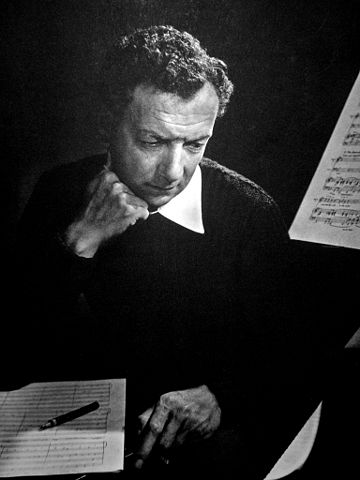
Benjamin Britten in the 1950s by Karsh
After the success of Peter Grimes, the War Requiem marked a second peak in Britten’s public acceptance and popularity, and during the early 1960s he developed close friendships with Dmitri Shostakovich, Sviatoslav Richter and the cellist Mtislav Rostropovich, for whom he composed a cello sonata, cello suites and a cello symphony. Shostakovich dedicated his fourteenth symphony to Britten, who conducted the first Western performance of it at Aldeburgh. By the mid 1960s the Aldeburgh Festival was outgrowing its home (the Parish Church) and, in 1967, when a nearby Victorian maltings became available, it was Britten’s and Pears’ vision which turned it into an 830-seater concert hall with fine acoustics. This vision was required again in 1970 when the original building was destroyed by fire and was rebuilt within a year with no interruption to the Festival.
Britten’s penultimate opera, Owen Wingrave, was not written for the stage, but was the response to a commission from the BBC for a television opera. It was first transmitted in 1971. In 1973, and with failing health, the final opera, Death in Venice, was the only work Britten wrote specifically for the newly rebuilt concert hall at Snape Maltings. Pears was against the project and is said to have complained at the time "Ben is writing an evil opera, and it's killing him." Britten was indeed too ill to conduct its première, but, in the work, he gave Pears the most demanding role of their thirty-five-year association.
As well as for operas, Britten is remembered for his tremendous contribution to the genres of chamber music, solo song and church music, and for the many pieces written for children and amateur musicians which challenge but do not patronise them.
Having declined a knighthood, Britten accepted a life peerage in the year of his death. Other honours include the Companion of Honour (1953), and the Order of Merit (1965), as well as a Grammy for the War Requiem.